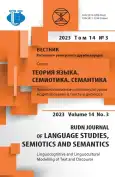Genre Varieties of Modern Kazakh Russian Story
- Authors: Bayanbayeva A.A.1, Demchenko A.S.1, Barabash V.V.2
-
Affiliations:
- Kazakh National University named after al-Farabi
- RUDN University
- Issue: Vol 14, No 3 (2023): LINGUOCOGNITIVE AND LINGUOCULTURAL MODELLING OF TEXT AND DISCOURSE
- Pages: 910-930
- Section: SEMANTICS AND SEMIOTICS
- URL: https://journal-vniispk.ru/2313-2299/article/view/323425
- DOI: https://doi.org/10.22363/2313-2299-2023-14-3-910-930
- EDN: https://elibrary.ru/FAACOF
- ID: 323425
Cite item
Full Text
Abstract
The purpose of this article is to identify and describe the two main genre varieties of the modern Russian Kazakh story. In the course of the study, the following methods were used: theoretical, historical-literary, system-typological approach, poetic-structural analysis of the work. In Russian Kazakh literature, realism and postmodernism are developing in parallel. The story of Nikolai Verevochkin “Singing in the transitions” is a realistic work. Its artistic world contains an image of a system of literary heroes based on determinism, the conditionality of the formation and development of a person’s character by various factors. Determinism contains the strong connection of the structural elements of the story. Verevochkin gradually reveals the characters of the heroes in various situations. The problematics of the story also has a traditional character for the literature of realism. The author demonstrates commitment to humanism, which is the ideological basis of realism. The article also analyzes the work of postmodernism - the story of Asel Omar “Alphabet”. The definition of “story-lexicon”, introduced by the author of the article, reflects the genre and generic features of this work. The story-lexicon Asel Omar consists of micro-novellas, which at the same time are dictionary entries. The peculiarity of these articles is that they are based on a certain storyline. The micronovelas are arranged in alphabetical order, which gave the author of this article reason to call them dictionary entries. Asel Omar’s lexicon story, in contrast to Nikolai Verevochkin’s story, is written in a freer plot form. The application of the essay principle allowed the author to create a reasoning story. The main thing for Assel Omar is to express her thoughts on various topics. The work of Nikolai Verevochkin is a narrative story. Thus, in modern Russian Kazakh prose, two main types of story are presented - realistic and postmodern story. Due to historical and cultural reasons, the realistic story prevails. The work of Asel Omar “Alphabet” is a unique example of a postmodern story-lexicon in modern Kazakh literature.
Keywords
About the authors
Aigul A. Bayanbayeva
Kazakh National University named after al-Farabi
Email: aigul_bayanbayeva@mail.ru
ORCID iD: 0000-0002-6120-2111
Senior Lecturer of the Department of Russian Philology and World Languages
79, Al-Farabi Avenue, Almaty, Kazakhstan, 050040Alena S. Demchenko
Kazakh National University named after al-Farabi
Author for correspondence.
Email: alenchika@mail.ru
ORCID iD: 0000-0002-0635-9247
PhD, Acting Associate Professor of the Department of Russian Philology and World Languages
79, Al-Farabi Avenue, Almaty, Kazakhstan, 050040Viktor V. Barabash
RUDN University
Email: barabash-vv@rudn.ru
ORCID iD: 0000-0002-8909-2145
D.Sc. (Philology), Dean of the Faculty of Philology, Head of Department of Mass Communications, Faculty of Philology
6, Miklukho-Maklaya str., Moscow, Russian Federation, 117198References
- Ananyeva, S.V. & Savelieva, V.V. (2014). Russian literature. In: Modern literature of the people of Kazakhstan. Almaty: Evo Press. pp. 70–158. (In Russ.).
- Creativity of Russian writers of Kazakhstan (1992). Literary-critical essays, Kh. Gabdirov & Sh.R. Yeleukenov (eds.). Almaty: Gylym. pp. 229–265. (In Russ.).
- Badikov, V. (2005). New winds. Essays on the modern literary process of Kazakhstan. Almaty: Zhibek Zholy. (In Russ.).
- Dzholdasbekova, B.U. (2015). Prose of Russian writers of Kazakhstan. Almaty: Cossack University. (In Russ.).
- Dzholdasbekova, B.U. & Kakilbaeva, E.T. (2011). Russian writers of Kazakhstan: a biographical guide. Almaty: Kazakh University publ. (In Russ.).
- Chagin, A.I. (2011). After the split: Russian literature today. In: The latest foreign literature: Collective monograph. Almaty: Zhibek Zholy. pp. 325–336. (In Russ.).
- Dzholdasbekova, B.U., Zhaksylykov, A.Zh., Sarsekeyeva, N.K., Bayanbayeva, Zh.A., et al. (2016). Aesthetic diversity of the humanitarian discourse of the literature of Kazakhstan during the period of Independence. Almaty: Kazakh University. (In Russ.).
- Sarsekeyeva, N.K. (2006). Forms of expression of the author’s consciousness in Russian literature at the turn of the 20th—21st centuries. Almaty: Kazakh University publ. (In Russ.).
- Savelyeva, V. (2012). Our modern novel as a genre mix and a non-commercial project. Prostor, 3, 164–177. (In Russ.).
- Tattimbetova, K.O. (2015). Genre of the novel in Kazakh literature of the late XX — early XXI centuries. Polylinguality & Transcultural Practices, 5, 360–365. (In Russ.).
- Tattimbetova, K. (2017). The fate of the modern novel genre in Kazakhstan. In: Actual problems of the development of world science. Materials of the III International Conference. Kiev. pp. 112–117. (In Russ.).
- Akasheva, S.S. (2007). Russian story of Kazakhstan in the 60-80s of the XX century (Questions of genre and style). Almaty: Alla prima. (In Russ.).
- Savelyeva, V.V. (2015). Stories in modern prose of Kazakhstan: criticism and actualization of the genre. Neva, 12. URL: https://magazines.gorky.media/neva/2015/12/rasskazy-vsovremennoj-proze-kazahstana-kritika-i-aktualizacziya-zhanra.html (accessed: 12.02.2023).
- Bart, R. (1989). Selected Works: Semiotics: Poetics. Moscow: Progress. (In Russ.).
Supplementary files









